






LSU has been sanctioned in federal court for failing to preserve data on tennis coaches’ cell phones amid a Title IX lawsuit.

Ten former LSU students brought the lawsuit against the university and athletics officials in 2021 for their alleged failures to investigate claims of sexual violence. Three of those plaintiffs include former LSU tennis players Jade Lewis, Abby Owens and Kennan Johnson.
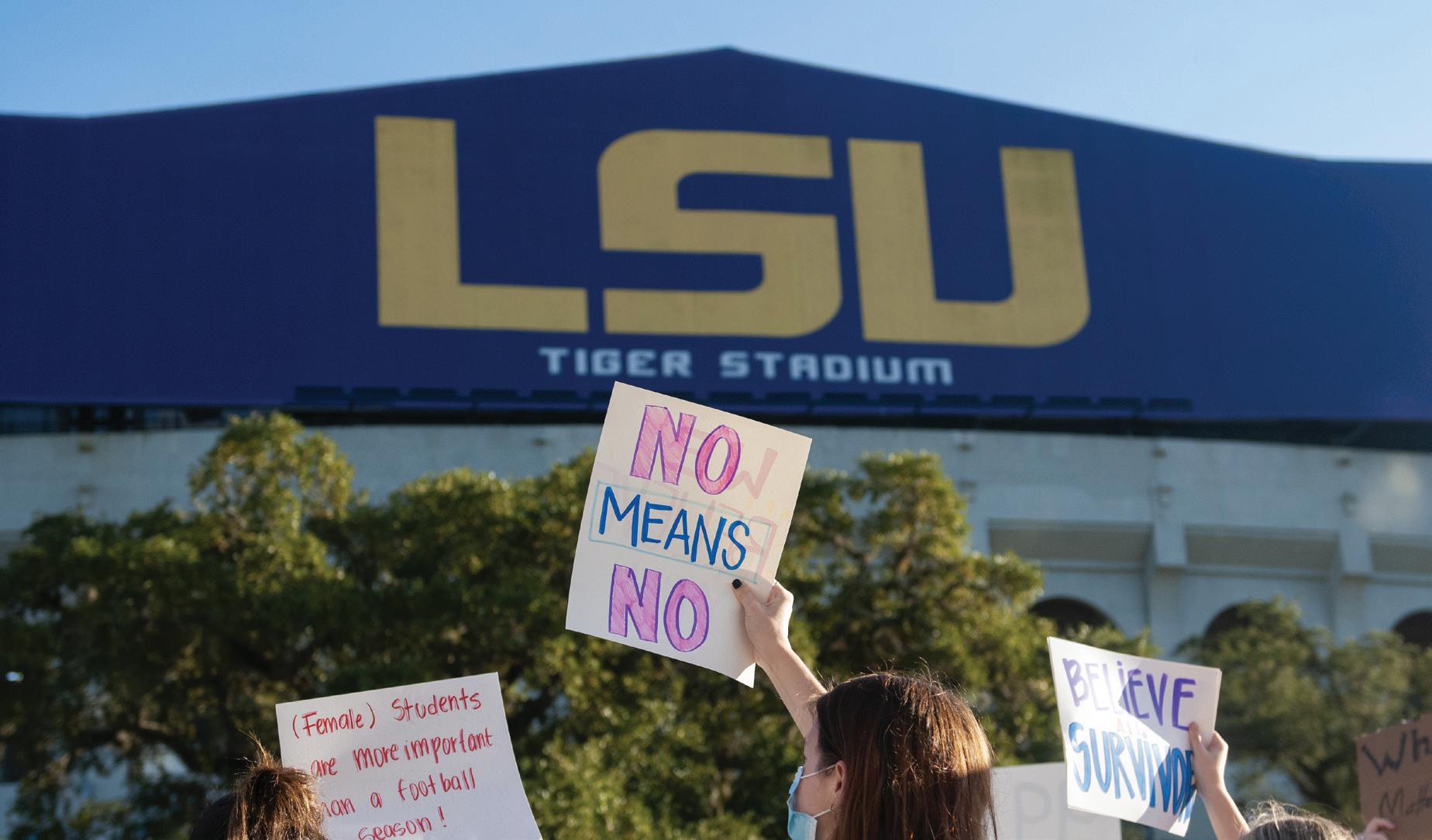
USA Today reported in November 2020 that co-head tennis coaches Julia and Michael Sell allegedly ignored reports that one of their players had been raped and another had been the victim of dating violence in 2017 and 2018.
In a 2020 Reveille report, former players involved in the lawsuit described a “toxic” culture under Julia Sell rife with weight shaming, mental abuse and injury negligence.
“You shouldn’t go play a sport you love at your dream school and leave wishing you never went there,” Johnson told the Reveille in 2020.
The Sells were listed as defendants when the lawsuit was first filed but were dismissed along with other defendants in January 2022. The LSU Board of Supervisors is the sole remaining defendant.
Though they are no longer defendants, the Sells are still “key players” in the lawsuit, U.S. Magistrate Judge Scott Johnson said in his Sept. 29 order sanctioning the university.
“Given the Sells’ role in this litigation, it stretches the bounds of reason to think their LSU-issued cell phones would contain no relevant communications,” Johnson wrote.
That data may have helped the plaintiffs prove their case, and the

court determined LSU “did not take reasonable steps to preserve the Sells’ text communications.”
For that reason, Johnson determined, LSU must “pay reasonable expenses, including attorney’s fees and costs,” that the plaintiffs incurred because of the university’s failure to preserve the cell phone data.
The Sells left their jobs at LSU and returned their universityissued cell phones around April 2022, according to court documents. The plaintiffs issued a subpoena requesting text messages from those phones in July of that year.
The Sells said they couldn’t provide the data as they no longer had the phones. In September 2022, the plaintiffs asked LSU for the phone data. A month later, they were told the data wasn’t available.
The plaintiff’s attorney inspected the phones in January 2023 and confirmed they had
been completely wiped, according to the court documents.
The university argues that the data had already been wiped from the phones when the Sells returned them.
“It was incumbent upon [the Sells’] counsel to inform them of their obligations to preserve the data in their possession,” LSU media relations coordinator Abbi Rocha Laymoun said in a statement to the Reveille. “LSU IT staff who received the devices testified that the phones were empty of all data when examined after their return. LSU took appropriate steps to protect data controlled by and in the possession of LSU.”
The court said it “cannot find on the existing record that Defendant wiped the phones’ data with intent to deprive,” but that intent was not needed for LSU to owe the plaintiffs.

“No finding of intent is necessary to impose sanctions here— the Court may impose appropri-

ate sanctions to cure even an inadvertent loss of information if it should have been preserved in anticipation of litigation,” wrote Judge Johnson, who left the door open for the trial judge to decide whether LSU intentionally wiped the phones to hide potential evidence.
A date for the trial has yet to be set.
Johnson said the university’s failure to preserve the cell phone data was “particularly egregious” given that the court gave a verbal order for LSU to maintain electronically stored information, or ESI, and that the parties entered an agreed ESI order.
“Our clients are very pleased that the court has acknowledged and is holding LSU accountable for its failure to preserve important evidence in their case,” said Elizabeth Abdnour, one of the attorneys representing the plaintiffs, in a statement to the Reveille.
LSUReveille.com
@lsureveille
B-16 Hodges Hall
Louisiana State University Baton Rouge, La. 70803
NEWSROOM (225) 578-4811
Editor in Chief CLAIRE SULLIVAN
Managing Editor LAUREN MADDEN
Digital Editor JOHN BUZBEE
News Editor CROSS HARRIS
Deputy News Editor OLIVER BUTCHER
Sports Editor PETER RAUTERKUS
Deputy Sports Editor MACKAY SUIRE
Entertainment Editor MOLLY TERRELL
Opinion Editor COLIN FALCON
Multimedia Editor MATTHEW PERSCHALL
Production Editor MADISON COOPER
Chief Designer EMMA DUHÉ
ADVERTISING
(225) 578-6090
Layout/Ad Design BEAU MARTINEZ
Layout/Ad Design SAMUEL NGUYEN
The Reveille holds accuracy and objectivity at the highest priority and wants to reassure its readers the reporting and content of the paper meets these standards. This space is reserved to recognize and correct any mistakes that may have been printed in The Daily Reveille. If you would like something corrected or clarified, please contact the editor at (225) 578-4811 or email editor@lsu.edu.
The Reveille is written, edited and produced solely by students of Louisiana State University. The Reveille is an independent entity of the Office of Student Media within the Manship School of Mass Communication. A single issue of The Reveille is free from multiple sites on campus and about 25 sites off campus. To obtain additional copies, please visit the Office of Student Media in B-39 Hodges Hall or email studentmedia@ lsu.edu. The Reveille is published biweekly during the fall, spring and summer semesters, except during holidays and final exams. The Reveille is funded through LSU students’ payments of the Student Media fee.
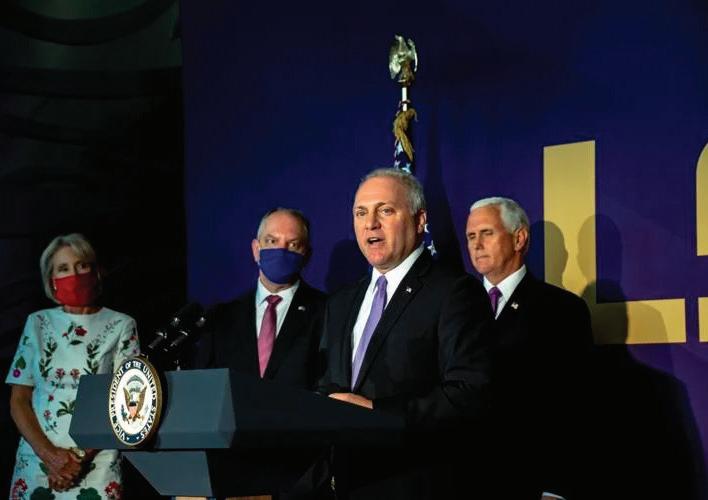
WASHINGTON (AP) — The stunning removal of Kevin McCarthy as speaker left the House effectively paralyzed Wednesday as Republicans struggled to bring order to their fractured majority and begin the difficult and potentially prolonged process of uniting around a new leader.
The House opened briefly then went into recess, with North Carolina Rep. Patrick McHenry, the caretaker speaker pro-tempore, serving in the job with very little power for the foreseeable future. Other Republicans left Washington, awaiting the next steps.
The House will try to elect a speaker as soon as next week. The timing is nowhere near certain as Republicans line up for their chance at the gavel amid the bitter divisions that sparked the chaos.
The House majority leader, Rep. Steve Scalise, R-La., is in line for the post, but he faced an immediate challenge from Rep. Jim Jordan, R-Ohio, the Judiciary Committee chairman and a favorite of conservatives, who
quickly announced his own candidacy. Others are expected to emerge.
Many doubt that anyone can get the 218 votes needed to become speaker. Voting for Mc-
The pronounced, dry banks of Baton Rouge’s University Lakes have not been caused by recent dredging or construction, according to the leader of the restoration project. Rather, the conditions are because of extreme heat.
“A lot of people thought we were draining it as part of the project,” said Mark Goodson, the project lead, in an interview with the Reveille. “But no, it’s just that dry and shallow.”
By the project’s start, record breaking hot temperatures had already been lingering over Baton Rouge for weeks.
Louisiana has suffered a drought for weeks, under a burn ban and Gov. John Bel Edwards announced a state of emergency because of the heat on Aug. 14.
Renovations to the six University Lakes began in late summer and will be carried out over a couple of phases, hopefully to conclude two or three summers from now, Goodson said.
see SCALISE, page 4 see DRY, page 4 CULTURE
Every year, on the first Sunday of October, the West Baton Rouge Museum holds SugarFest: a 28-year-old celebration of the sugarcane harvest that attracts people from all over to come together and enjoy part of what makes Louisiana a cultural marvel.

At SugarFest, everything is free, which is a part of the appeal and what encourages firsttime attendees to try two of the most important things they can experience at the festival: chewing sugarcane and drinking sugarcane juice.
Alma Plantation brings over sugarcane and cuts it up. Like many Louisianians of the past, people chew on the cane to get all the sweetness out. Then, they can pick up a green cup of juice filled with the sweet taste of the fields that surround the museum.
The main museum was open to the public for the duration of the festival and is currently home to a variety of works, including a plethora of George Rodrigue paintings featuring his famous
Blue Dog alongside his Cajun paintings. Another collection named “Rooting Metal, the Trahan Gallery” featured musicians playing inside the Museum.
All day, visitors walked through the museum’s historic buildings, including the Arbroth Plantation Store. The old-timey store had an abundance of historical artifacts and historicallyaccurate props. A blacksmith, woodworker and other tradesmen contributed to the atmosphere while showing visitors a bit of the past.
Outside, the museum grounds were covered with tables with anything accessible to the imagination. Genealogy, archeology and countless artists sold their work. One of the most well-loved areas of SugarFest is the French Area, packed with people of all proficiency levels gathering to celebrate and practice the language.
Elizaveta Barrett, a Louisiana native and a French speaker, spent her day enjoying what the festival had to offer. Sitting at the “On Parle Français” section with her husband, who is in
SCALISE, from page 3 ciating rounds even though he was the consensus choice of the GOP conference.
House Republicans plan to meet Tuesday evening at the Capitol for a first round of internal party voting.
“I think the circus stuff needs to happen behind closed doors,” said Rep. Garret Graves, R-La.
It is shaping up to be wide open battle just as Congress faces a new deadline to fund the government by mid-November. Work on that legislation in the House is on hold due to the vacancy in the speaker’s office, creating the potential for extended paralysis.
Senate Majority Leader Chuck Schumer, D-N.Y., called it a “dangerous situation.”
At the White House, President Joe Biden said the American people still expected the
DRY, from page 3
Coincidently, around the time when phase one of the renovations started, the water level of the LSU lakes dropped noticeably. The declined water level left dead fish and trash; then the ground began to crack.
Goodson said most people aren’t aware the University Lakes are as shallow as they are. Expectations are usually closer to 15 feet, not 5, he said.
The project’s first phase is valued at $32 million, Goodson said. The main objective of the current phase is to make the lakes ecologically healthier. This involves dredging, making connections from University Lake to City Park Lake and construction around May Street.
SUGARFEST, from page 3 charge of education at the West Baton Rouge Museum, Barrett conversed with the other French speakers.
When asked about the growth in people speaking French in Louisiana, Barrett said in French, “Me, I think that everyone is looking for an identity, and it is hard to do that in the United States because of the period of assimilation, because everyone lost their culture.”
She added, “It is not just a language, it is a culture, it is an identity.”
Like many Louisiana French speakers, Barrett’s family lived in Louisiana when speaking French was “interdit:” French for “forbidden.”
In 1921, Louisiana’s constitution was amended to allow only English-speaking schools, essentially banning all French-speaking schools in the state and adding to the discrimination French speakers were already experiencing. The past demonization of French is a scar many Louisiana residents and their families carry to this day. Recently, however, resources like Council for the Development of French in
government to get its work done in a timely fashion. McCarthy was ousted because he worked with Democrats to keep the government open and avoid a shutdown, and the Democratic president said: “We need to stop seeing each other as enemies.”
Electing a new speaker risks inflaming the divisions that have plagued House Republicans all year, particularly if lawmakers make new demands before pledging support.
Scalise has long been viewed as a potential speaker-in-waiting and is revered as a survivor after he was shot in the hip at a congressional baseball team practice in 2017. But Scalise is also being treated for a form of blood cancer, forcing him away from the Capitol at times.
In a letter to colleagues asking for their support, Scalise acknowledged the challenges ahead for him and Republicans, but said he has overcome adver-
The lower water level actually makes it harder for workers to do their job, Goodson said.
LSU oceanography and coastal science professor Kevin Xu echoed Goodson’s account. Xu said he didn’t have any specific data, but that the drought Baton Rouge has been in most likely translates to an imbalance in the water table.

Essentially, Xu said, not only was the lakewater rapidly evaporating, but that it was also too dry for the lakes to hold water, thanks to a lack of groundwater.
Recent rainfall and the season’s turn to fall are good signs regarding the weather and the lakes looking healthier, Xu said.
Still, Goodson said the lakes are “at least 2 feet below what they should be.”
sity before.
“This next chapter won’t be easy, but I know what it takes to fight and I am prepared for the battles that lie ahead,” he wrote.
Jordan made his own pitch by emphasizing his oversight work and aspirations. He echoed Scalise’s call for unity during “divided times.”
“The problems we face are challenging, but they are not insurmountable,” he said.
Jordan and Scalise are expected to be joined in the race by at least one other Republican: Oklahoma Rep. Kevin Hern, chair of the Republican Study Committee, the largest GOP caucus in the House.
All three men, as well as Majority Whip Tom Emmer of Minnesota, spoke at a luncheon of the Texas congressional delegation, which represents the largest bloc of GOP members in the House.
“I think you have to have
a different set of skill sets, you know, I spent 35 years in business working at some of the largest corporations in the world,” Hern said as he left the meeting. “Strife is something that’s common when you have people working together and finding common solutions for it takes experience.”
But some Republicans, including Rep. Marjorie Taylor Greene of Georgia, say lawmakers should look outside the Capitol for their next speaker, as the Constitution allows, and draft former President Donald Trump.
Trump told reporters at a New York courthouse Wednesday that he will “do whatever it is to help” Republicans in the speakership race, but that he is focused “totally” on his presidential campaign.
“If I can help them during the process, I would do it. But we have some great people in
the Republican Party that could do a great job as speaker,” he said.
The more immediate challenge for Republicans is moving past the extraordinary strife that has plagued their conference in recent weeks. The raw feelings were apparent at a closed-door meeting Tuesday evening where members unloaded their anger at the eight Republicans who joined with Democrats to depose McCarthy.
Rep. Mike Kelly, R-Pa., pointed at the lawmakers who voted against McCarthy and said, “I’ve never been part of a worse team,” according to a Republican in the room who was granted anonymity to discuss the private session.
Louisiana and Nous French are seeing a comeback in Louisiana as more families seek to reconnect with their French-speaking heritage.
Barrett also spoke of one of her favorite parts of SugarFest:
“The music is so good here, and it’s free.”
Folk, country, Cajun, and jazz were just a few of the genres that played throughout the day, but no matter who was playing or what genre it was, visitors were
entranced by the music. The Storyville Stompers performed the song “St. James Infirmary” to roaring applause.
The West Baton Rouge Museum continues in its mission of being an educational resource

for the history and culture of the parish and Louisiana through SugarFest, which has become a tradition for many residents.
“The time [of year] is beautiful,” Barret said. “There are many reasons to come here.”

If you’re looking for a way to get creative this year, BellyFire Studios might be the place for you. They offer everything from pottery painting to wheel-throwing lessons, and it’s only a five-minute drive from campus.


Owner and LSU alumnus (‘20) David Rollins encourages all students to challenge themselves and try new things this year. He aims to help artists and beginners discover their inner creativity.
“The main goal for BellyFire is to support artists,” Rollins said. “It’s important to support passionate local artists and provide growing artists with a space to explore their journey in art.”
When you first walk into the studio, the walls are lined with options for a “paint your own pottery” experience. Anyone can enjoy the opportunity to glaze a mug, figurine, plate or even a unique holiday pottery piece while letting their imaginations run wild with ideas.
This experience is perfect for students looking for a quick break between classes, as it can be fun and therapeutic. You can even find decorations for your dorm or apartment with.
We attempted to glaze some pieces of our own. The process takes around 10 days, and then you’ll have your very own pottery creation. My editor and I chose a llama and a leaf jewelry dish.
There was a wide variety of colors available, but be careful with how detailed you make your design, because you’ll have to do three coats.
The llama dish turned out lovely and detailed, but the leaf jewelry dish left much to be desired because the intended tie-dye look did not take effect.
“Paint your own pottery” isn’t all the studio offers, though. Rollins mentioned he was most excited about the classes BellyFire Studios are offering.

One of their more popular events is “Merlot and Mud” nights every Saturday, where participants spend two hours creating beautiful ceramics and sipping their favorite drinks. The studio also hosts “Clay Night” every Friday, where beginners and experts can create for two hours.
“These classes are a great creative date, more than anything else going on in town right now,” Rollins
said.
Rollins hopes the studio eventually grows to host these events every night.
For those looking for something more challenging, BellyFire Studios offers lessons from experienced instructors. These instructors educate on techniques and the skills necessary to form clay on a pottery wheel into spectacular pieces.
LSU student Ella King is a pottery instructor in some of BellyFire Studios’ classes. Just like Rollins, she recommends students start with one of their night classes and guarantees you will leave with a piece.
“I absolutely love that I can put my passion into what I do now and that I can help other people create a new hobby,” King said. “I’m so glad I found the studio, because LSU doesn’t allow non-art majors to take ceramics classes, so without BellyFire, I wouldn’t be able to do pottery at all.”
With an instrumental of Fleetwood Mac’s “Rhiannon,” Baton Rouge Gallery’s First Wednesday showcase began.
The gallery, which has exhibited multimedia art in Baton Rouge since 1966, holds its First Wednesday event every month except January and November.

First Wednesday showcases local artists for everyone, from a curious onlooker to an art collector, and is free and open to the public. Attendees can enjoy food, drinks and live music all courtesy of the members and donors of the gallery.
Four artists were showcased on this First Wednesday: Paulo Dufour with his glass-blown sculptures and colorful tree paintings, and James Flynn showcased his ultraviolet-activated optical illusions. Jacqueline Dee Parker also displayed works of vintage paper acrylic on linen.
The fourth artist, Michael W. Howes,has his depictions of “rugas,” creatures of his own making, and birds on display down the hall.
“The birds are kinda like birds, but not,” said Howes, who described his depictions of birds as the “light, angelic” side of Lake Boeuf. His “rugas” represent the “darker forms” with eyes made from old, red candy
wrappers so that they shine menacingly at the viewer.
Along with his drawings, Howes showcased a few of his wooden sculptures. His sculptures use wood from lightning-struck trees found at Lake Boeuf as the base and old wooden shingles from houses along Lake Boeuf as wings for the birds.
English major Issac Uzzell attended the event for the first time after his friends invited him to see the art.
“Lot of stuff with personality,” Uzzell said.
Uzzell commented on Howes’ art saying the “rugas” reminded him of a monster hiding under his bed.
Married art collectors and members of the Baton Rouge Gallery, Tricia Day and Joe Simmons, also attended the event. Day said that they have been attending events at Baton Rouge Gallery for a while and like that it showcases mostly local artists.
“It’s become a victim of its own success,’’ Simmons said, regarding the influx of attendees.
The success of First Wednesday has brought in a diverse group of people with members of the Baton Rouge community of all ages attending the event.
The next First Wednesday event will be on Dec. 6.



 Photos by: Tarun Kakarala
Photos by: Tarun Kakarala




LSU knew it had to rely on its offense to win.
After giving up 706 total yards to Ole Miss, it faced a similar challenge against Missouri on the road. Like the Ole Miss game, the offenses dominated, but this time, LSU made the plays it needed to, winning 49-39.
“I’m just so proud of the way they competed,” head coach Brian Kelly told ESPN in his postgame interview.
While still giving up 39 points and 527 yards, LSU’s defense got the late stops it needed highlighted by a pick six from Major Burns with under a minute left.
From the first drive, it was clear what type of game was going to take place. Missouri scored touchdowns on each of its first three drives, an offensive effort led by star wide receiver Luther Burden III, who finished the game with 149 yards on 11 catches.
After trailing throughout the first half, a pair of stops to start the second half helped LSU take its first lead of the game. The game flipped for LSU when Harold Perkins intercepted Brady Cook’s pass late in the first half.
“It’s taken us a while to get his role defined,” Kelly said of Perkins. “I think we’ve now es -
FOOTBALL
tablished where he can best fit and it really allows us to be consistent of how we set our front.”
From there, it became a race to the finish line.
Both offenses moved the ball with ease down the stretch of the game, a similar story to LSU’s previous two games.
LSU’s offense started the game by establishing the run,
and that paid dividends in multiple respects. LSU ran for over 200 yards in the game, and the early rushing success opened up the downfield passing attack in the second half.
The turning point of that success came on a 42-yard touchdown pass from Jayden Daniels to Brian Thomas Jr. which gave LSU its first lead of the game.
After a 55-49 loss to Ole Miss, it didn’t get any easier for LSU against Missouri. This time, though, the Tigers did enough, beating Missouri 49-39.
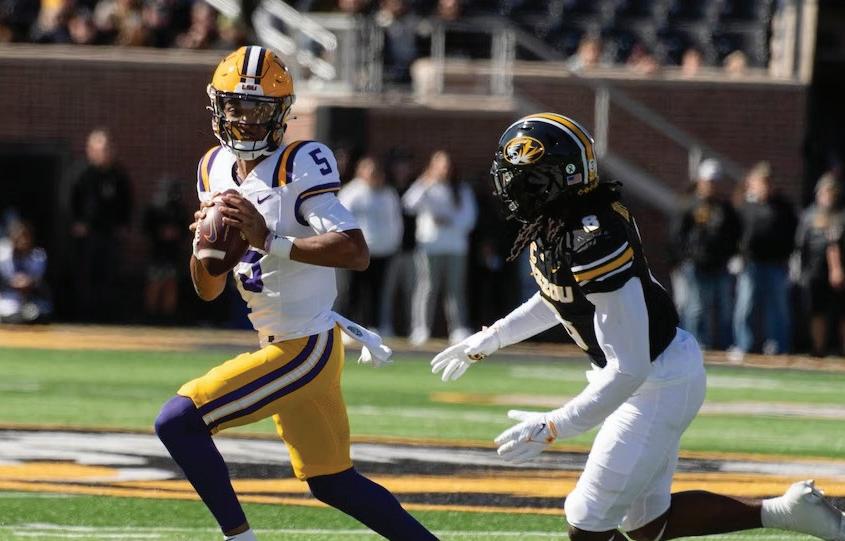
It was another shootout, but the defense made enough plays to secure the game. However, the offense was still the highlight, gaining over 500 total yards again.
Here are three takeaways from LSU’s win:
Jayden Daniels’ toughness is his most underrated trait: Throughout the season so far, Daniels’ improvement and development has been clear. While his running ability and decisionmaking remained elite from last season, his ability to stretch the field was displayed throughout the first five games.
The defense fell for the play action, and the misdirection in the secondary created space behind the defense that Thomas took advantage of.
Once the game hit the fourth quarter, it was clear the game would come down to the quarterbacks. For Daniels, though,
Against Missouri, though, his toughness is what led LSU to the win. He threw for 259 yards and rushed for 130 yards, but the most impressive part of his performance was his ability to play through injury.
In the third quarter, Daniels took a late hit after a designed run, and had to briefly leave the game with a rib injury. He was
It doesn’t get much worse than 706 yards allowed as a defense.
In fact, for LSU, it never has. The yardage Ole Miss piled up against the Tiger defense in September was the most any LSU defense has allowed in a game.
A visibly exasperated Brian Kelly had few words in his press conference immediately following the 55-49 loss.
“Angry, disappointed, I could give you all the adjectives,” Kelly said “It’s not the way I like to play football.”
The struggles of the LSU defense are at risk of jeopardizing the team’s season and wasting what is otherwise a strong team. Kelly needed to find a solution.
The following monday, Brian Kelly confirmed that LSU had hired legendary 82-year-old defensive line coach Pete Jenkins as a defensive analyst for the remainder of the season.
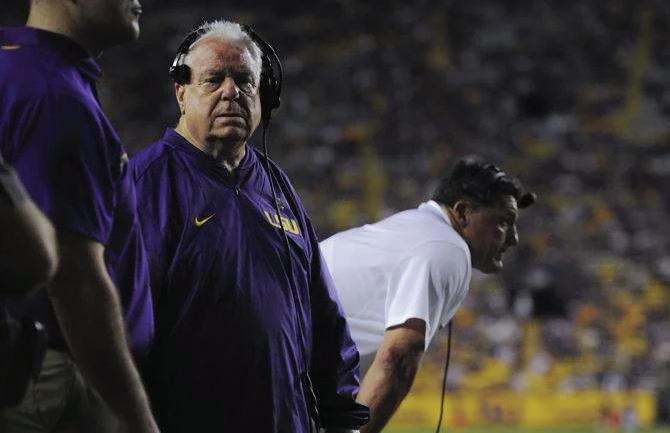
Jenkins has a long history with LSU, coaching the team’s defensive line from 1980-90, 2000-01 and 2016-17.
He’s also one of the most respected minds in football history when it comes to defensive line play. He’s known for a deep understanding of the position from its very basics and has worked as a consultant for teams and individual prospects for years since the end of his formal coaching career.
Jenkins has a history of serving as a steadying presence for new LSU coaches in the past, consistently coming through as an emergency option. Both Nick Saban and Ed Orgeron turned to the coach’s services early in their tenures.
Now, he’s been called on once again in LSU’s time of need. He’s expected to help shore up an LSU defense that may be one of the worst in program history.
More specifically, he has to see JENKINS, page 10
noticeably in pain on the sidelines, but came out for LSU’s next drive and ran for a 35-yard touchdown. He followed that up with what ended up being the gamewinning touchdown drive, where he had a 31-yard run that set up a 29-yard passing touchdown to Malik Nabers.
Head coach Brian Kelly awarded Daniels the game ball after the game for his efforts. Daniels led LSU to another win, and proved he can do it under adverse circumstances.
Special teams wasn’t perfect, but was one of the keys to LSU’s win:
LSU’s special teams wasn’t perfect. Damian Ramos missed a 28-yard field goal and Jay Bramblett had a 30-yard shanked punt, but LSU made plays on special teams that it wouldn’t have won the game without.
Despite missing the short field goal, Ramos made a 48-yard field goal in the first half in a spot where LSU badly needed points. It was down 22-7. The kick was a career long for Ramos, and it cut the Missouri lead to 12 before an interception on the next Missouri drive put LSU back in the game.
The next key special teams moment happened late in the game when LSU needed a play.
address an LSU defensive line that is performing well below expectations. The unit was supposed to be the strength of the defense, but in the game against Ole Miss, the Tigers were pushed around by what was supposedly a poor offensive line and finished with no sacks while allowing over 300 rushing yards.
So who is Pete Jenkins, besides the man tasked with rescuing the LSU defense?
Jenkins has LSU ties that go way back into Tiger history through multiple stints. He was originally hired as the defensive line coach at the school before the 1980 season and stayed on until 1990, surviving three different head coach tenures, a testament to the respect his skill has garnered.
Throughout those 11 seasons on the LSU staff, he had multiple stints as the defensive coordinator and associate head coach.
After head coach Mike Archer was fired following the 1990 season, Jenkins took the defensive line position with Mississippi State, where he stayed until he accepted the same position at Auburn in 1996.
Jenkins was on the Auburn staff through the 1998 season and finally returned to LSU as defensive line coach at the request of first-year head coach Saban in 2000 after a 3-8 1999 season for the Tigers.
He coached under Saban for two years before retiring and didn’t take another coaching job until Andy Reid called him to the NFL as the Philadelphia Eagles’ defensive line coach. Across his three years there from 2007-
Forced to punt with under a minute left in the game, Bramblett punted the ball 44 yards, and buried the ball on the sideline, going out of bounds at the fiveyard line.
That forced Missouri to go the length of the field in the shadow of its own goalposts, and the LSU defense got a pick six to seal the win.
LSU’s defense needs to be aggressive and force turnovers:
The LSU defense got carved up again. Missouri had over 500 yards of total offense and 39 points, but the defense did enough to secure a win.
In another shootout, turnovers were the difference. LSU forced two turnovers, including the game-sealing pick six. Before that, Harold Perkins had an interception in the first half, which put LSU back in the game before halftime and seemed to inspire the defense.
That interception led to Missouri settling for a field goal on the next drive, and getting stopped on the next two drives after that. LSU almost forced a third turnover after a fumble in the fourth quarter, and despite Missouri recovering, it created a fourth-and-32 that Missouri couldn’t convert.
LSU’s defense is still going to give up yards. But with how good the offense is, forcing just

09, he coached two future Pro Bowl defensive linemen in Jason Babin and Trent Cole and aided an Eagle defense that finished in the top 10 in points allowed twice.
After another retirement, Orgeron called for him to join his USC staff midway through the 2013 season after being named the interim head coach. After coaching for all of seven games there, Jenkins retired again.
When Orgeron once again found himself as the interim head coach of a team in 2016 with LSU, his first call was again Jenkins. Because of his strong relationship with Orgeron and his love for LSU, Jenkins couldn’t resist, despite the Tigers facing the tumultuous end of the Les Miles tenure. He was lured out of retirement again and was the defensive line coach through the 2017 season.
All told, Jenkins has coached over 30 defensive linemen who have gone on to play in the NFL across his many stops, from Leonard Marshall and Marcus Spears to Arden Key and K’Lavon Chaisson. He was also a part of Southeastern Conference championships for LSU in 1986, 1988 and 2001.
Throughout his many breaks from coaching, Jenkins has continued to offer his services to teams at all levels in brief consultations. This, however, will be his first permanent role on a coaching staff since 2017.
It would be a vast overstatement to assume the addition of Jenkins will be the fix-all for an LSU defense whose issues are clearly deep-seeded. The expectation for him is not Herculean:
based on his past stints, his role will likely be relatively parttime, and he’ll join as an advisor to current position coach John Jancek.
Still, the prospect of adding the expertise of one of the most storied position coaches in college football history to a group that sorely needs it is certainly interesting.
“We want to provide our student-athletes with the most resources, and Pete gives us the expertise and the ability to help us with technique,” Kelly said.
The Tigers’ defensive line group has plenty of talented but raw prospects like Sai’vion Jones and a star in the middle in Maason Smith who has stunningly been a non-factor this season.
Jenkins’ influence may be invaluable for those two players; the sky’s the limit for both of them, but it’s clear when watching their game that a certain refinement is needed. Enter Jenkins.
The loyalty Jenkins has for LSU is admirable, as he has come through for the program time and time again at pivotal junctures. However, it may say something about the state the LSU defense is in that the team is turning to an 82-year-old retiree.
Kelly needs to exhaust all options to salvage an LSU season that could potentially be great if the team’s all-world offense was matched with even an average defense, and he deserves credit for doing so.
Only time will tell if this move will prove fruitful, but the LSU defense can only go up from here.
DANIELS, from page 9 that wouldn’t be easy.
After what he thought was a touchdown, Daniels took a hard, late hit in the endzone that caused a rib injury. Despite the injury, he didn’t back away from the challenge.w
“He’s just got the heart of a champion,” Kelly said.
On the next drive after the injury, Daniels ran for a 35-yard touchdown to give LSU the lead, and after Missouri scored on the following drive, Daniels led another touchdown drive, capped off by a touchdown pass on the
run to Malik Nabers.
That touchdown ended up being the difference, and led by Daniels, LSU got a win it desperately needed.
Daniels finished the game throwing for 259 yards and three touchdowns while rushing for 130 yards and a touchdown. His perseverance willed LSU to the win, a win that can give LSU some hope back to be a contender in the SEC West.
“Jayden Daniels is just a warrior,” Kelly said. “He’s tough, he’s physical, he’s smart, he’s skilled, I can’t use enough superlatives about him individually.”

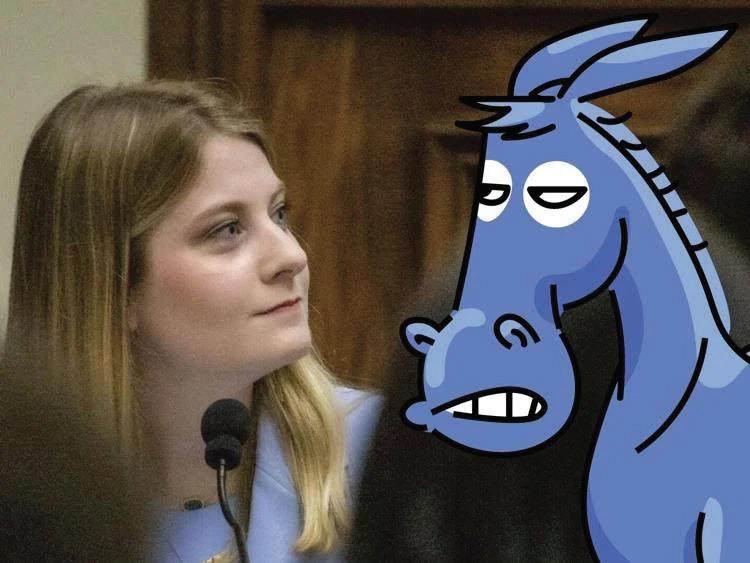
PELLITTIERI
@m_pellittieri
In their response to the nowoverridden veto of a resolution condemning Attorney General Jeff Landry, the LSU College Democrats managed to lose their important message in a jumbled mass of dirty politics.
This is a deeply disappointing mistake.
Before that, though, it must be clarified that this has nothing to do with the quality of the resolution or the reasoning behind the veto. In fact, the authors of the resolution were right to introduce it, and the Student Senate was right to pass it and override the veto. Even the College Democrats were right to be upset by that veto.
The problem lies with the actual content of and likely motivation behind the College Democrats’ statement.
Landry’s absence from the Debate LSU forum is one of the many reasons why his candidacy is so obviously dangerous for the state. He has and will continue to ignore vast swaths of Louisiana’s population. It’s imperative to oppose him, but that opposition shouldn’t come
at the cost of stooping so low.
It’s been an incredibly difficult year for Louisiana Democrats. Legislators have become Republicans. The state party and governor endorsed a challenger to one of their own incumbent representatives. The official X (Twitter) account quite literally liked a post about the party being secretly run by the GOP.
This dismal leadership combined with the infighting it has caused makes it clear that
today’s Louisiana Democratic Party can’t effectively oppose Landry and his ilk.
But the College Democrats’ statement doesn’t instill much confidence in the future generation, either.
The offending passages within their statement claimed that Student Body President Anna Catherine Strong may “not feel a responsibility to [her electorate],” called her veto a “partisan defense” and alleged that she
was “weaponizing her office against the Student Body.”
These are all purposefully provocative statements rooted largely in assumptions and exaggerations, but the particulars of the statement are ultimately not what’s so concerning about how the College Democrats handled the situation. That dishonor belongs to the particular brand of politics that their language seemingly reveals.
This is the all-too-common practice of politics as a show.
It’s the kind of politics practiced by those teens in high school youth and government who give speeches filled with hyperbole, straw men and various other rhetorical ploys intended to trick everyone into thinking they’re knowledgeable and committed when, in reality, they’re just in it for the attention.
They feed off of both the positive and the negative responses.
Some examples of politicians who treat their profession as a show include prominent Republicans like Sens. Josh Hawley of Missouri and J. D. Vance of Ohio, Reps. Marjorie Taylor Greene of Georgia and Lauren Boebert of Colorado and former President Donald Trump.
For all these folks, politics isn’t about affecting change in
government. No, it’s just plain fun. And not because of what they can accomplish through debate, activism and lawmaking. It is fun in a vacuum; they enjoy the fight for its own sake.
Of course, the College Democrats aren’t equal to those fascistic MAGA conservatives. Rather, there appears to be a similar motivation behind their confrontational politics. There’s no heartfelt outrage or justifiable frustration in their show, just the pure dopamine rush from adoration or derision.
The showman mentality can and often does accompany a genuine desire for change. Additionally, the statement may have been written from a more selfless place than its content implies. But it’s crucial that our future leaders exhibit positive intentions and behaviors.
The College Democrats should be better than this. And they can be. Indeed, they must be if the extremism of the right is going to be effectively countered.
If the next generation embraces its better angles, then the Louisiana Democratic Party of tomorrow might hope to win.
Matthew Pellittieri is a 19-yearold history and political science sophomore from Ponchatoula.

ISABELLA ALBERTINI
@BasedIsabella
If there’s one thing all Latinos have in common, it’s that we’re proud of who we are and where we come from.
We embrace and celebrate our heritage every day, because our culture is such a significant part of who we are. Latinos have such a strong cultural pride that it’s contagious.
Hispanic Heritage Month is a great way to celebrate and share our Latin American cultures with others. Instead of letting our identity blend in with Western trends, we must continue to preserve our authenticity and values.
To elevate the voices of Hispanic students on campus, I decided to interview other Latin
 Cross Harris
Cross Harris
News
EditorAmerican students in the LatinX Center at LSU’s Office of Multicultural Affairs and hear their opinions on Hispanic culture.
When asked what the best way to share our culture is, Hector Alvarez, a history senior, replied, “I would say through music and through dance, because Latin America is so diverse in those categories.”
Music, dance, food and family were other common responses about what we all share and value most as Latinos.
“I feel like a lot of people don’t value their family and having a big family and connecting with each other that way,” said Maya Zavala, a biochemistry sophomore. “Like people have asked me before, why are you always with your family?”
For a lot of Latinos, family doesn’t just mean parents and siblings, but grandparents, cousins and everyone in between.
Knowing they always have your back is a great support system.
Just as there are cultural differences, there are differences in language and translation. Understanding how it all works is key to understanding our identity.
“I don’t like the word Hispanic. I prefer Latino,” said Saleen Gonzalez, a political science and Spanish senior. She then explained that Hispanic refers only to Spanish speakers, whereas Latino includes all Latin Americans.
I asked for her take on the term “LatinX,” as we were all in the LSU LatinX Center.
“Some people aren’t familiar with how the Spanish language is structured,” Gonzalez said. Touching on grammar and pronunciation, she explained that it is hard to pronounce the letter X at the end of a word in Spanish.
“LatinX is a very English
word,” she said. “Companies need to do a better job of asking an actual Latino for our opinion instead of taking one for us.”
Although Hispanic Heritage Month was originally created to recognize the achievements and cultural contributions of Hispanic Americans, it has lost part of its significance, becoming another marketable campaign in today’s extra-commercialized society.
“Target’s Hispanic Heritage thing, I know they mean well, but it’s a money grab,” Gonzalez said. “Any Latino knows they can go to a Hispanic business and support it, not just for one month. It feels like a money grab more than anything.”
When asked about many Americans’ concerns over cultural appropriation, Gonzalez replied, “Real Latinos don’t really care about cultural appropriation. The second you start talk-
ing bad about our people, that’s when I draw the line.”
Today, nearly 20% of people in the U.S. are Latino, and about 80% of them are citizens, according to the Pew Research Center.
As a tight-knit, growing demographic in America, we must continue to remain true to our identity and beliefs. It’s important to uphold the values and traditions we were raised with.
It can be easy to want to change who we are to fit in, but by doing so, we lose what makes us unique.
“I think we should stick together,” Gonzalez said. “We all have that mutual understanding. Once you learn we’re Latino, we instantly click, and if you continue that, that is how it should be.”
The Reveille (USPS 145-800) is written, edited and produced solely by students of Louisiana State University. The Reveille is an independent entity of the Office of Student Media within the Manship School of Mass Communication. Signed opinions are those of the author and do not necessarily represent the views of the editor, The Reveille or the university. Letters submitted for publication should be sent via e-mail to editor@lsu.edu or delivered to B-39 Hodges Hall. They must be 400 words or less. Letters must provide a contact phone number for verification purposes, which will not be printed. The Reveille reserves the right to edit letters and guest columns for space consideration while preserving the original intent. The Reveille also reserves the right to reject any letter without notification of the author. Writers must include their full names and phone numbers. The Reveille’s editor in chief, hired every semester by the LSU Student Media Board, has final authority on all editorial decisions.
“You can tell a lot about a fellow’s character by his way of eating jellybeans.”
Ronald Reagan Former U.S. president1911 — 2004
